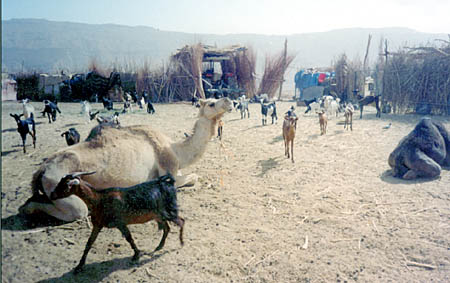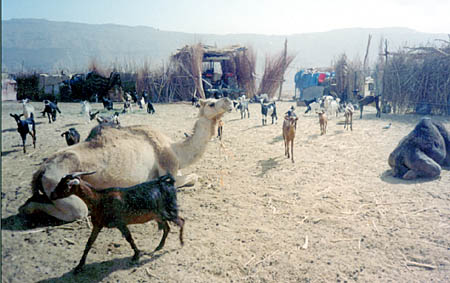
In Thanah Valley Living the hard life [Archives:2002/20/Culture]
May 13 2002

BY HASSAN AZZAIDI
YEMEN TIMES STAFF
Enjoy the camels milk. Stay away from the mosquitoes. And get ready for the heat.
Theres some advice for you if youre ever going to visit the Thanah Valley, one of Yemens most historic places.
This is the part of Yemen, in fact, which was where the ancient kingdom of the famous Queen of Sheba ruled.
Its also is the valley where the Mareb dam flows into. To the upper side of the dam many Bedouins live for the availability of considerable waters. People here mainly depend on breeding livestock and use camels as a means of transportation.
Houses of the Bedouins in this part of Yemen are made up of sticks. This is, in part, because its the best way to deal with the deadly heat of this region. Unlike other Bedouins areas, tents cannot be used here because of the heat.
Education facilities are nonexistent here. The illiteracy rates is extremely high due to the people heedlessness towards this issue, as well as the governments negligence. Just few people from this valley have access to education.
The problem of mosquitoes here is a real nightmare. This is because of the swamps formed at the far ends of the dam. The only dream of the people is that the government will someday establish a spraying program to spray insecticides in the swamps.
Saleh al-Amsi, an inhabitant of the valley, said malaria spread by mosquitoes killed his brother and sister.
Im the only boy of my family, so I preferred to stay with them to help and not to go to school. Mosquitoes are my biggest enemy. They never let me sleep, no matter what I use to prevent them from reaching me.
Agriculture is vital for the Bedouins of the valley due to the availability of water. Yet, they still face one major problem: floods, usually on a yearly basis.
Camel milk is the most preferable food for the Bedouins. Further, Bedouins think that camel milk has extraordinary nutritious value. Bedouins are very proud to drink this milk, as they regard as part of their identity.
——
[archive-e:20-v:2002-y:2002-d:2002-05-13-p:./2002/iss20/culture.htm]


